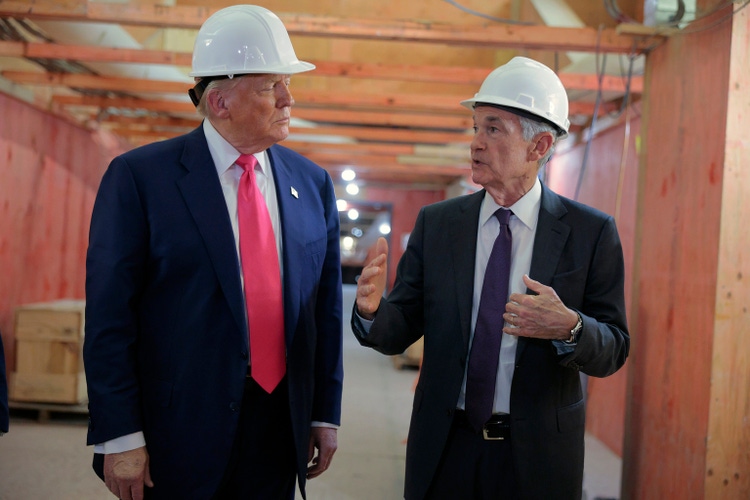US Tariffs: In a sweeping move likely to strain global trade ties, United States President Donald Trump has signed a fresh executive order revising tariffs for 70 countries, including India, Pakistan, and Bangladesh.
India faces a steep 25 per cent tariff, while neighbouring countries such as Pakistan will be subject to a 19 per cent levy, Bangladesh 20 per cent, Afghanistan 15 per cent, and Sri Lanka 20 per cent. Myanmar, however, has been hit with an even higher tariff of 40 per cent.
The revised tariffs will take effect from 12:01 am EDT on August 7, as per the order signed Friday (IST). The executive order, citing a national emergency declared earlier under Executive Order 14257, says these duties replace earlier rates imposed under the same directive.
“I have determined that it is necessary and appropriate to deal with the national emergency declared in Executive Order 14257 by imposing additional ad valorem duties on goods of certain trading partners,” Trump stated in the order.
According to the White House, the new tariffs will apply to all goods entering the US for consumption or withdrawn from bonded warehouses on or after the effective date. However, items already in transit, loaded and en route before August 7 and arriving before October 5, 2025, will continue under the previously applicable tariff schedule.
Wider tariff landscape
Several countries will see higher tariff rates than India, including Iraq at 35 per cent, Laos at 40 per cent, Libya at 30 per cent, Serbia at 35 per cent, South Africa at 30 per cent, Switzerland at 39 per cent, and Syria at 41 per cent.
Others, such as the UK at 10 per cent, Taiwan at 20 per cent, Vietnam at 20 per cent, South Korea at 15 per cent, and Japan at 15 per cent, will face lower tariff rates than India.
The White House noted that the adjustments are targeted at nations "that have failed to align sufficiently with the United States on economic and national-security matters" or "have offered terms that… do not sufficiently address imbalances in our trading relationship."
More deals incoming
A senior Trump administration official told reporters that more trade agreements could be announced soon as part of the president’s broader push for higher "reciprocal" tariffs. "We have some deals," the official said. "And I don't want to get ahead of the President of the United States in announcing those deals."
Canada and Mexico: Mixed signals
Canada and Mexico remain exempt from the sweeping changes under the US-Mexico-Canada Agreement (USMCA). However, a separate directive raises Canada’s fentanyl-related tariff from 25 per cent to 35 per cent, citing Ottawa’s "failure to cooperate" on curbing fentanyl trafficking.
In contrast, Mexico secured a 90-day reprieve from a proposed 30 per cent tariff on most non-automotive and non-metal goods. This move followed a call between Trump and Mexican President Claudia Sheinbaum. The US will continue to apply a 50 per cent tariff on Mexican steel, aluminium, and copper, and a 25 per cent tariff on autos and non-USMCA-compliant goods.
"Additionally, Mexico has agreed to immediately terminate its Non-Tariff Trade Barriers, of which there were many," Trump said on Truth Social, though he did not elaborate further.
Brazil, South Korea, and India: Rising tensions
On Wednesday, Brazil was hit with a 50 per cent tariff amid rising tensions over the prosecution of Trump ally Jair Bolsonaro. The order spared key Brazilian sectors like aviation, energy, and orange juice.
South Korea struck a deal to cap its tariffs at 15 per cent, including on auto exports, in exchange for a 350 billion dollar investment pledge into Trump-approved U.S. projects.
India, however, did not fare as well. Talks reportedly stalled over U.S. access to India’s agriculture sector. This prompted the imposition of a 25 per cent tariff and threats of an "unspecified penalty" linked to India’s continued oil imports from Russia.
The Indian government has vowed to shield its labour-intensive farming industry. This drew criticism from the opposition and triggered a fall in the rupee.
China’s deadline looms
Meanwhile, all eyes are on August 12. That is the deadline for the US and China to reach a comprehensive tariff agreement. The world’s two largest economies had reached preliminary deals in May and June, but unresolved issues remain, including tariffs and access to rare earth minerals.

 15 hours ago
1
15 hours ago
1







 English (US) ·
English (US) ·